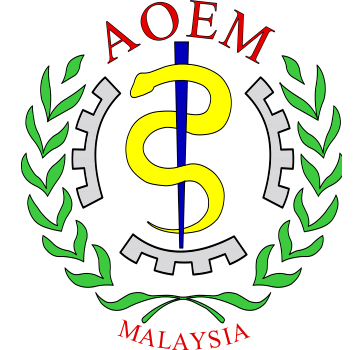
STATEMENT
We refer to the recent events highlighted in the media surrounding the discovery of squalid living condition of foreign workers in several large manufacturing companies in the Klang Valley. The Academy of Occupational and Environmental Medicine, Malaysia (AOEMM) views this as a serious issue that warrants attention, urgent action and a strong commitment from all stakeholders.
As the country continues to develop well into the 21st century, there continues to be a heavy reliance on foreign workers in "3D" (dirty, dangerous and difficult) jobs. According to official data from the Ministry of Home Affairs, as of 30th June 2019 there were a total of 2,002,427 foreign workers in Malaysia, out of which 699,430 (34.9%) and 438,264 (21.9%) were from the manufacturing and construction sectors respectively (Reference Link). Bear in mind that there are also many undocumented foreign workers that may be in the same situation.
The rapid growth and development of Malaysia, coupled with the low interest and uptake of 3D jobs among Malaysians, have provided job opportunities to foreign workers, who travel far from their countries of origin and their families to seek better incomes abroad. Over time, Malaysia has made strides in improving their working conditions, most recently providing better benefits through the extension of coverage of the Employees’ Social Security Act 1969 to them.
Nevertheless, there are still issues that need to be considered. Many foreign workers have to undergo hardships ranging from exploitation, to debts with their employment agencies, to lack of basic entitlements such as housing and sanitation.
Unfortunately, foreign workers continue to live under these poor conditions with no end in sight. It has been seen that some employers set up hostels and dormitories while cramming as many workers into a space as possible. Some workers are forced to live in cramped conditions and share inadequate sanitary facilities. In construction sites, some workers are placed by their employers in temporary cramped squatter-type dwellings with limited access to clean water and sanitation. Some do not speak up for fear of being punished, having their employment terminated or, worse, deported home by their employers.
To further add to the problem, there are also undocumented foreign workers, sometimes working as "freelancers", who also live in poor condition in illegal squatter areas. These conditions can lead to public health issues such as food poisoning and widespread transmission of communicable diseases such as COVID-19 and tuberculosis.
There is already appropriate legislation in place to govern this. The Workers' Minimum Standards of Housing and Amenities Act 1990 (Act 446) outlines "the minimum standards of housing and nurseries for workers and their dependents, to require employers to allot land for cultivation and grazing in a place of employment, to require employers to provide health, hospital, medical and social amenities and to provide for matters incidental thereto".
The AOEMM believes that all stakeholders need to play their part in tackling this issue:
1. Employers play the most important part in ensuring and caring for the health, safety and welfare of their employees, especially with company-managed worker accommodation. Additionally, they should actively listen to their workers’ feedback and complaints and give reassurance that they will not be punished for speaking up.
2. Regulatory authorities and government bodies need to play more active roles in performing more regular inspections of worker accommodations. Stern action should be taken against errant employers. In addition to enforcement, employers should be given appropriate education and guidance on the safety, oversight and monitoring of the hygiene of their facilities.
3. Worker/trade unions play a key role in ensuring the voices of workers are heard. Anonymous channels should be set up to enable workers to speak up while protecting their identities and privacy.
4. Occupational Safety and Health (OSH) practitioners such as Safety and Health Officers (SHO) and Occupational Health Doctors (OHD) can guide employers on hazard identification, risk assessment and risk control (HIRARC) in managing health and hygiene of employer-provided workers' accommodations.
We laud the recent initiative by the Ministry of Human Resources to launch a multi-lingual application for workers to lodge complaints against their employers and hope to see more platforms like this in future (reference link). There has also been a spate of inspections by authorities on worker dormitories over the past weeks. However, it is clear that much more needs to be done to truly address this issue holistically.
We cannot deny that the rapid growth and development of Malaysia would not have been possible without the contribution of foreign workers. Let us work together to improve their health and well-being.
The Academy of Occupational and Environmental Medicine Malaysia (AOEMM)
ADVERTISEMENT
ADVERTISEMENT


































